
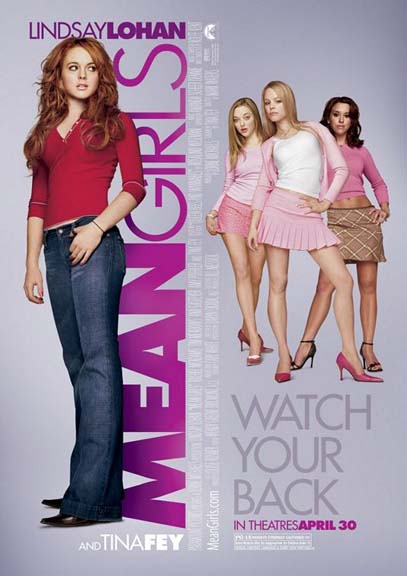
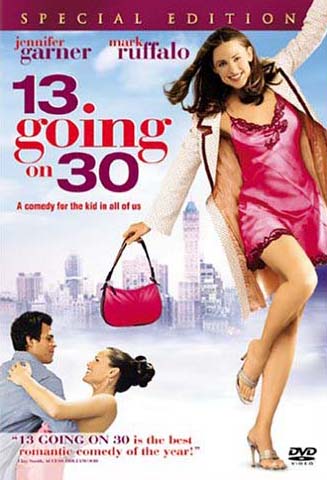
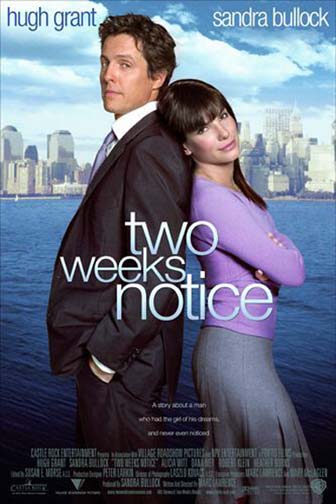
 |  |  |  |
Discourse
"refers to groups of statements which structure the way a thing is
thought, and the way we act on the basis of that thinking discourse is a
particular knowledge about the world which shapes how the world is
understood and how things are done in it" (Rose 142). Movies construct
discourses about women and then the audience evaluates themselves, as
women, or evaluates the women in their lives (if they are a man)
according to the discourse Chick Flicks send. Chick Flicks, by many
scholars, are seen as films that are derogatory towards women even
though they are aimed towards a female audience. There are many
problems with chick flicks such as they show women competing against
women instead showing sisterhood, they show females as cultural dupes
that buy into every consumer trap, they display women as being weak,
emotional wrecks, dumb, stupid, mindless beings that rely on men for a
backbone, and exclude problems women encounter that focus on Race,
Sexuality, and Class. Movies have power because they give out certain
discourses about women. "Discourse disciplines subjects into certain
ways of thinking and acting it does not impose rules for thought and
behavior on a pre-existing human agent. Instead, human subjects are
produced through discourses. Our sense of our self is made through the
operation of discourse, discourse produces the world as it understands
it, (Rose 142). Very often women shape themselves based on what they
see in the media and chick flicks. The way chick flicks represent women
is important in shaping femaleness in our culture.
In most chick flicks, unlike the few that go against the normal
discourse set in this genre, the main theme is centered on a Cinderella
story type; "Girl meets boy, sparks fly, they fall in love. A
misunderstanding or a minor misdemeanor breaks them up but the pair are
thoroughly miserable apart. They're back together by the end, usually
employing the Big Embarrassing Public Declaration of love" (Ide) The
"Big Embarrassing Public Declaration of love" usually involves the male
being the hero and rescuing the damsel in distress.
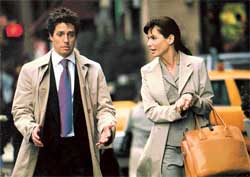 | 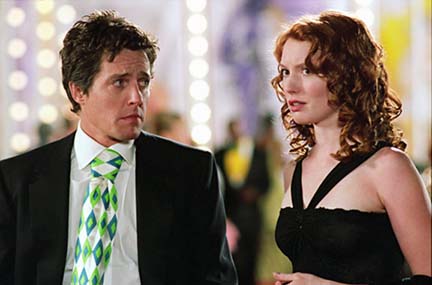 | 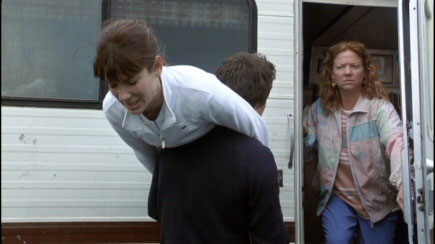 |
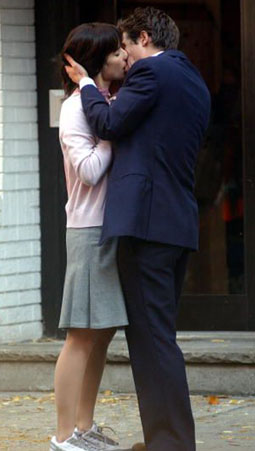 | In Two Weeks Notice the male protagonist, Mr. Wade (Hugh Grant), tells Lucy (Sandra Bullock), a poor advocate lawyer who unfortunately hasn't had much luck winning cases, by working for him she might actually win a law case (scene pictured upper left). This lets the audience believe that only by connecting to a male can women succeed in life. When Lucy starts the job she discovers Mr. Wade uses her more as a personal assistant rather than his company lawyer. For instance, Mr. Wade calls her out of her best friends wedding to help him choose a suit (scene pictured on right). Therefore, Lucy decides she can't help Mr. Wade any longer and turns in her two weeks notice. Lucy gets jealous when the new woman and Mr. Wade have sexual relations (woman and Mr. Wade picture upper middle). Mr. Wade comes after Lucy in the end of the movie by giving a romantic speech or a "Big Embarressing Public Declaration ". Lucy rejects Mr. Wade at first but after her co-workers point out how stupid that was of her, she chases after him and they live together happily ever after (scene pictured on right). | 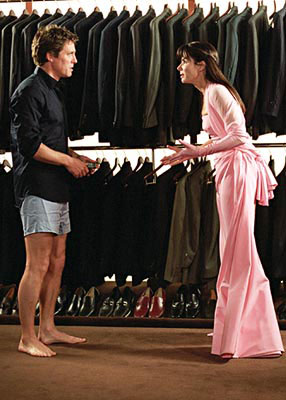 |
In 27 Dresses Kevin (James Marsden), the male protagonist of the film, tries to help the female protagonist Jane (Katherine Heigl) when a retaliation against her sister upsets Jane. Instead of letting Kevin be there for her she pushes him off and then comes off as the cruel one in the situation.
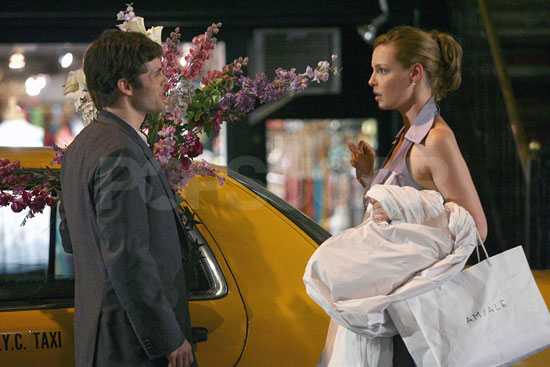 | 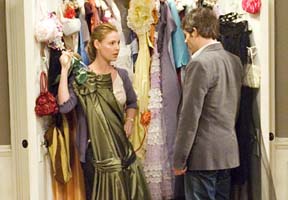 | 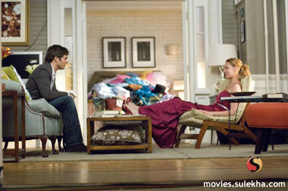 |
The common theme in these films and several others is the male usually makes some kind of positive feedback to the girl in which the girl rejects and then looks like the ruthless person in the situation. This type of positive feedback or "saving the damsel in distress" is a key part of psychoanalysis, voyeurism, which structures how the spectator sees image of women in narrative cinema, voyeurism is a way of seeing that is active; it distances and objectifies what is looked at, it deals with castration anxiety by investigating the woman and then saving her, [this is created by] putting distance between the male and female protagonists of a movie, (Rose 117) .
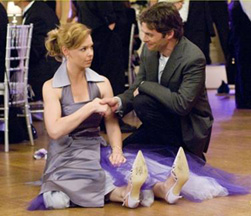 | The male in chick flicks often chase after or has a distance between the woman protagonist and the male protagonist either because some job the male and female have distances them or some other situation in which the male cannot reach the female until eventually the male comes to a point where he can save or support the female protagonist. In 27 Dresses the male protagonist tries to support the female protagonist but she rejects his support and ends up looking like the ruthless person in the situation. |
Hence, chick flicks set out this discourse that women are indecisive and also the antagonist in relationships. The male is seen as the protagonist in which he gives his heart to the female and the audience feels remorseful for the male figure because he is rejected. After trying to rescue her, the movies then end with a happy ending in which the girl recognizes she was wrong and chases after the boy to plead for him to still have her. "Some chick flicks, promote the choice of romance, family, and love over career and independence.
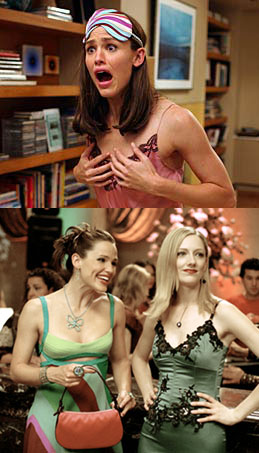 | Such films as Kate and Leopold (2001), 13 Going on 30 (2004), Raising Helen (2004), and the Family Stone suggest that a career-oriented woman is a lonely and unhappy one" (Ferriss and Young). In almost all chick flicks no matter the plot, the woman protagonist is out to find love and ends up in some kind of man hunt resulting in giving up their dream career for their dream guy. For instance, in 13 Going on 30 (2004), Jenna (Jennifer Garner) turns from 13 to 30 after a birthday wish. After seeing that she gained the one job she always hoped for at a fashion magazine, she thought life was perfect until she realized that in order to get this thriving job she lost her best friend and lifetime love. At the end of the film we see the character make different choices as a thirteen year old in order for her to acquire the man of her dreams instead of her dream career. | 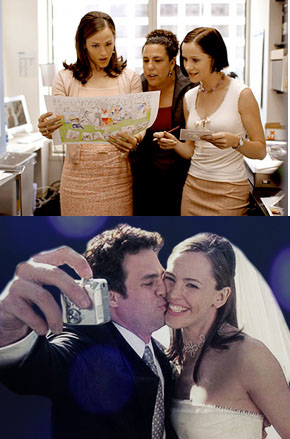 |
In Raising Helen (2004), Kate Hudson plays Helen who is a successful independent woman whose life seems good until her sister dies and she has to take over raising three children (featured bottom left). With the help of the male pastor (pictured bottom center) at the private school the children attend, she is able to get her life in control but not without sacrificing her job. In order for her to have this family and a love relationship with the pastor she has to change her once successful career life into a successful family life.
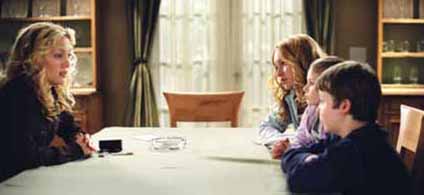 |
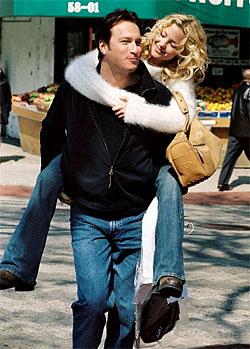 |
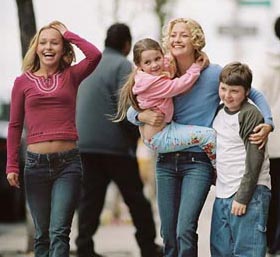 |
Helen (Kate Hudson) and Jenna (Jennifer Garner) display the cultural discourse that in order for women to have a successful family life they must sacrifice their successful career life, instead of having it all. This depicts to women that in order to be happy they have to choose whether they want love or a job because having both is not an option.
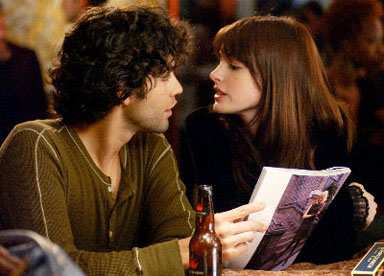 | I think this statement is very clear in the film The Devil Wears Prada when Anne Hathaway gets a chance of her lifetime to work with the biggest fashion magazine. When she takes the demanding job she loses everything important to her, her boyfriend, her friends, and her morals. In the end she gives up the job in hopes to find all that she has lost. This sends the message that women can't be successful in their career life without losing their romantic relationship and/or family. "In the world of chick flicks, successful women are by all appearances, terribly unhappy women. Heck, they are worse than unhappy, they are alone and unloved simply by the matter of their success" (Barnes). |
The main characters of chick flicks are usually young, heterosexual, middle class, white females. Thus, dismissing the interest of those with other classes, race and sexuality.

Assuming that most women will take interest in the common woman meets man and no recognition to women who are not heterosexual. "chick flick 'straight'-jackets sexuality, by foregrounding heterosexual romance, others have pointed to possibilities for more complex, even resistant, viewing practices, cinema is a public fantasy that engages spectators, particular, private scripts of desire and identification. While some female viewers may identify with the attractive chick-flick heroine who is the object of male desire on screen, others may see her as an object of desire herself" (Ferriss and Young). Chick flicks are supposed to engage all types of women but instead they fail to recognize homosexual relationships and instead focus on heterosexual romance. They also neglect to recognize other cultures. Since women are from all different cultures it is important for movies that are suppose to dedicate their interest to women in general it is important they represent women from all backgrounds rather than acknowledging women of different classes and dealing with the problems they have and acknowledging others cultural backgrounds they only take interest in the "problems" of white middle class heterosexual females.
Two other very prevelant derogatory themes among chick flicks is how they show the image of women and the very popular usage of "cat fights" in these films.
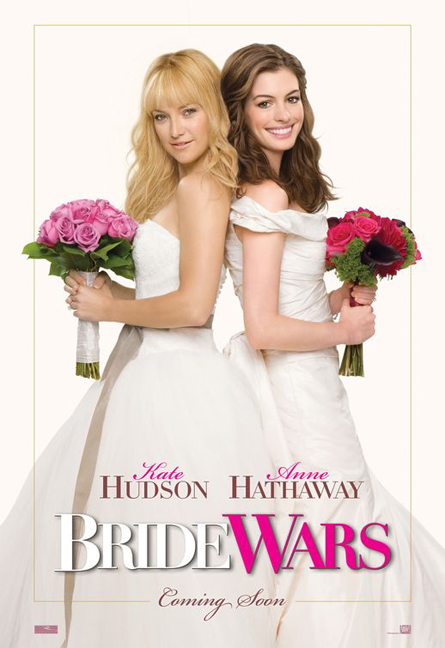 | 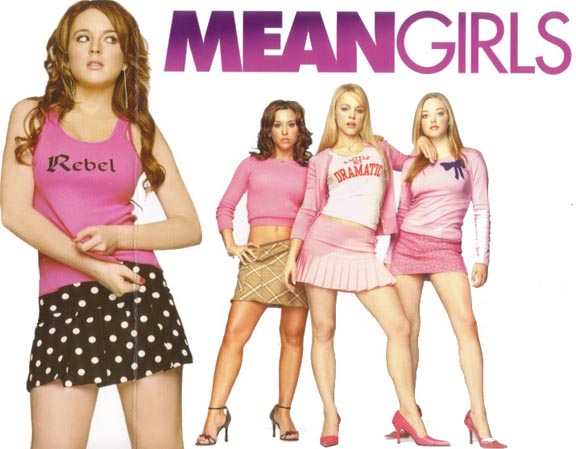 | ||